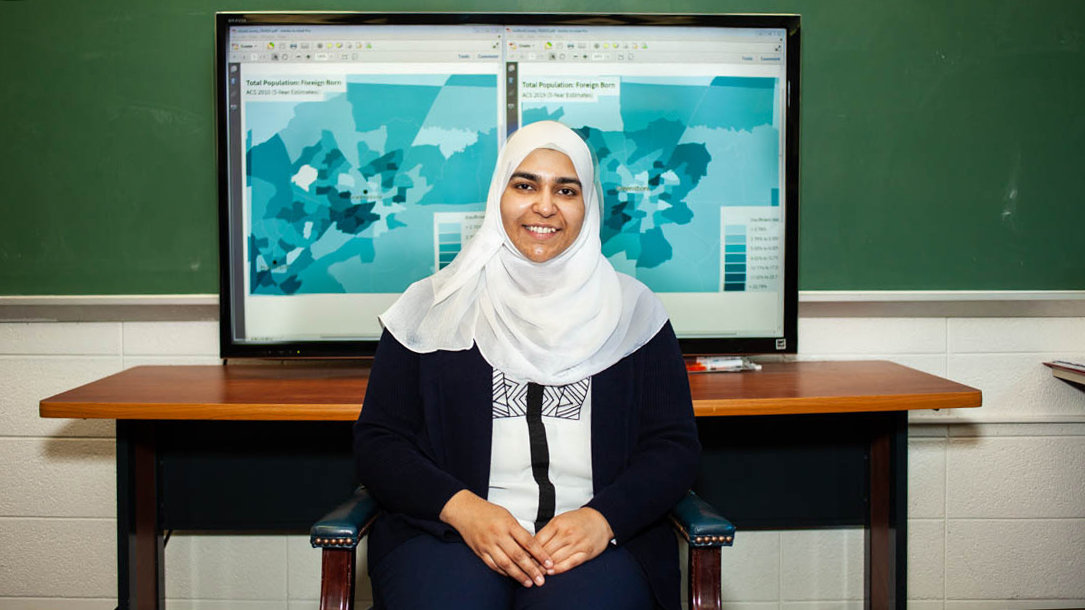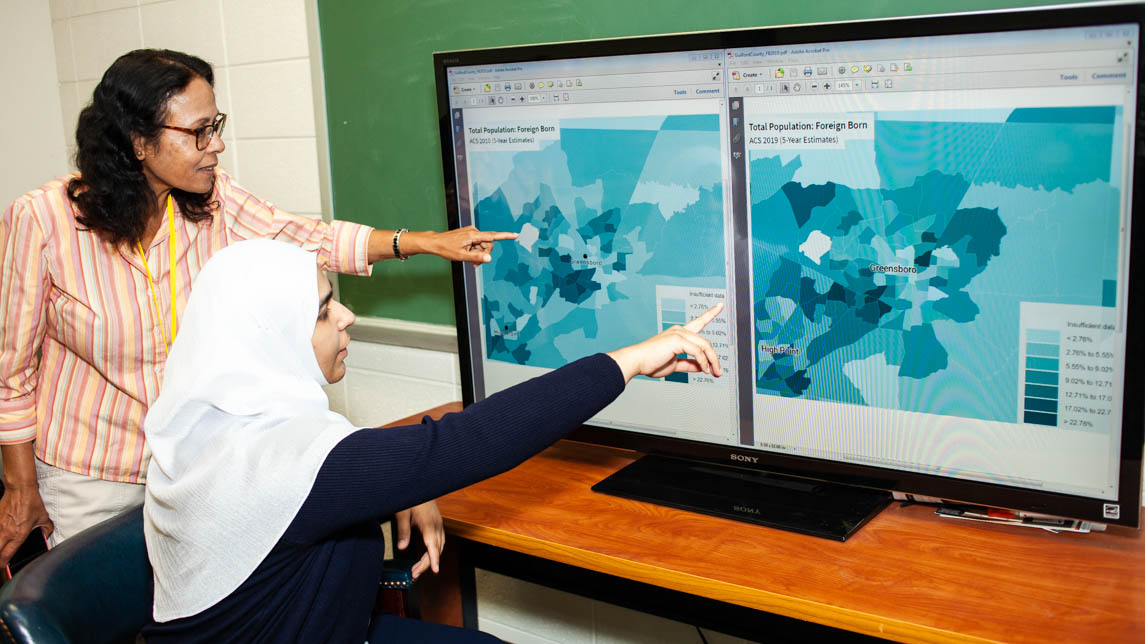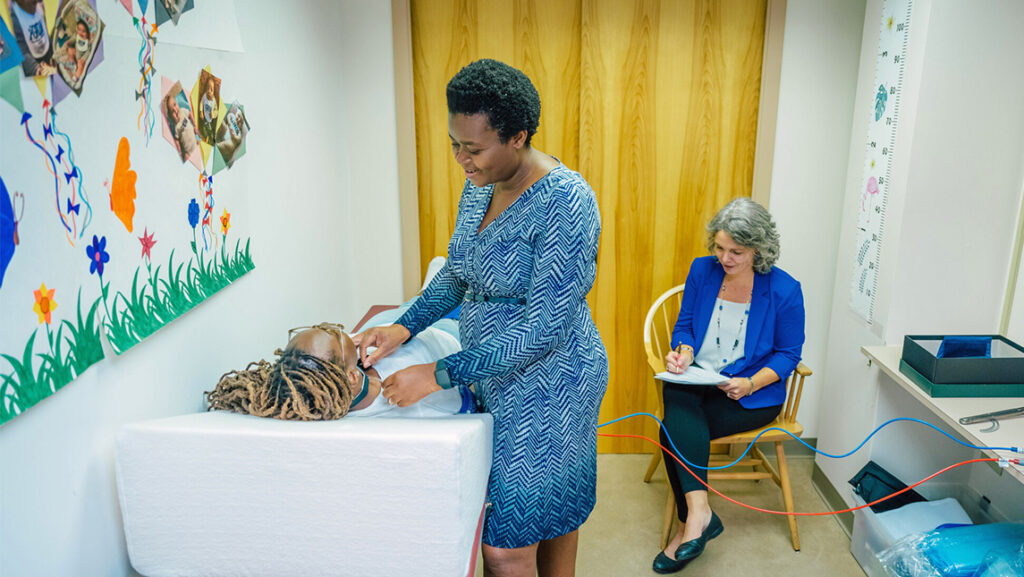
Nabeela Farhat has found an academic home at UNC Greensboro. After receiving her bachelor’s and master’s degrees from UNCG, Farhat is now pursuing her doctoral degree under the mentorship of her advisor, Selima Sultana, professor in the Department of Geography, Environment, and Sustainability.
While this soon-to-be triple Spartan has spent the last 16 years in North Carolina, Farhat was born about 7,000 miles away in Pakistan. She immigrated to the U.S when she was five years old – first moving to Stockton, CA before finding her way to Greensboro. Farhat said her personal journey piqued her interest in other immigrants’ experiences, and that this interest was solidified when she began her undergraduate studies at UNCG.
“Growing up in America, I was always really interested in the concepts of integration and assimilation,” Farhat said. “When I got into undergrad, I started taking geography courses, and some of those classes fostered more excitement and interest in these topics.”
Farhat followed this growing interest in geography into graduate school at UNCG where she has excelled in research and teaching. Her accomplishments include receiving the Michael Lewis Award for Graduate Outstanding Teaching Assistant in Spring 2022 and the Best Master’s Paper Award from the Southeastern Division of American Association of Geographers in 2019. As a doctoral candidate, Farhat explores immigrants’ settlement patterns in less-studied gateway cities, including Greensboro.
Sultana said Farhat brings a unique combination of personal traits and experiences to her research area.
“Nabeela is very thorough, thoughtful, and resilient,” Sultana said. “She’s hard working, but also has the ability to take feedback and follow through with it.”
Farhat is currently channeling her hard work and passion into her three-paper dissertation. She said much of the academic knowledge about gateway cities focuses on large metropolitan locations, such as New York and Chicago. However, smaller cities, such as Greensboro and High Point, have also become popular gateway cities due to multiple factors, including job training, housing affordability, and opportunities for entrepreneurship. Another key factor is that these smaller cities have programs designed to promote access and integration for new immigrants and refugees, according to Sultana.
For example, Sultana explained that immigrants have helped revive Greensboro’s Market Street area by opening up businesses, including a variety of ethnic grocery stores and restaurants, which native-born population enjoy. Still, much is unknown about these immigrants (i.e., nativity), their relationships with each other and their neighbors from other social groups, and their impact on the city’s socioeconomics and political outcomes.
Farhat said she aims to generate insight to help fill this research gap, including exploring and identifying which cities across the U.S. are emerging gateways, who is moving to these locations in terms of their backgrounds, and how the dynamics in the city–from businesses to relationships–shift with their arrival.
She will utilize multiple research perspectives, theories, and methods to investigate these research topics, including quantitative and geographic information systems for generating and mapping a categorization of gateway cities (i.e., a typology) and conducting in-depth interviews (i.e., one qualitative research methodology).

One of Farhat’s motivations in conducting this research is to spark conversations in the future about improving immigrants’ experiences integrating in their new communities that foster a pluralistic society. In conducting her research, Farhat said Sultana’s mentorship has been key.
“She is extremely supportive not just in my academic career, but also in my personal life,” Farhat said.
Sultana said she was initially struck by Farhat’s intelligence and ability to “shine in the classroom.” As they began working with one another, Sultana encouraged Farhat, who is a self-described introvert, to step outside of her comfort zone, including by working as UNCG’s Research and Instruction in STEM Education (RISE) Network graduate assistant.
The RISE graduate assistant position’s responsibilities included assisting with community engagement events, federal grant applications, and networking events: all people-facing tasks that may be daunting to an introvert. Farhat said this role challenged her, built her confidence, and increased her knowledge of a faculty member’s day-to-day job.
“It was a lot of exposure for me to leave my comfort zone,” she said. “And I’m very grateful for that because I would not have been able to build that skill, especially understanding what professors and faculty do other than teaching.”
Farhat brings this confidence she gained as the RISE graduate assistant to her research meetings with Sultana and to the classroom as an instructor. In Spring 2022, she taught Introduction to Human Geography where she aimed to spark students’ curiosity and encouraged them to think critically about current events. Sultana said Farhat is a dedicated instructor who “knows how to go beyond and above to help her students.”
“I get really excited when I give them an article to read, and then they can come in and have a very engaged discussion about that topic,” Farhat said.
Farhat said she hopes to continue her teaching in geography and research on immigrants’ settlement patterns after graduating from UNCG – a place that she said has shaped her growth as a scholar. She said that the Department of Geography, Environment, and Sustainability in particular has provided helpful resources, including encouragement to attend conferences and strong mentorship that are preparing her to reach her career goals.
“UNCG has provided me with the foundation of theoretical, methodological, and practical skills and knowledge that I know I can apply to the real world and improve our understanding about immigrants’ contributions,” Farhat said.
Story and photography by Rachel Damiani


